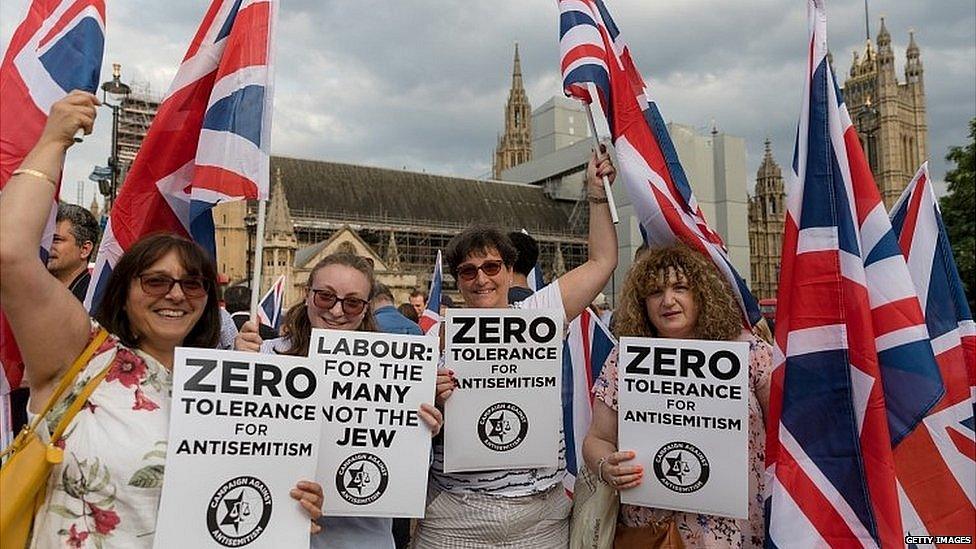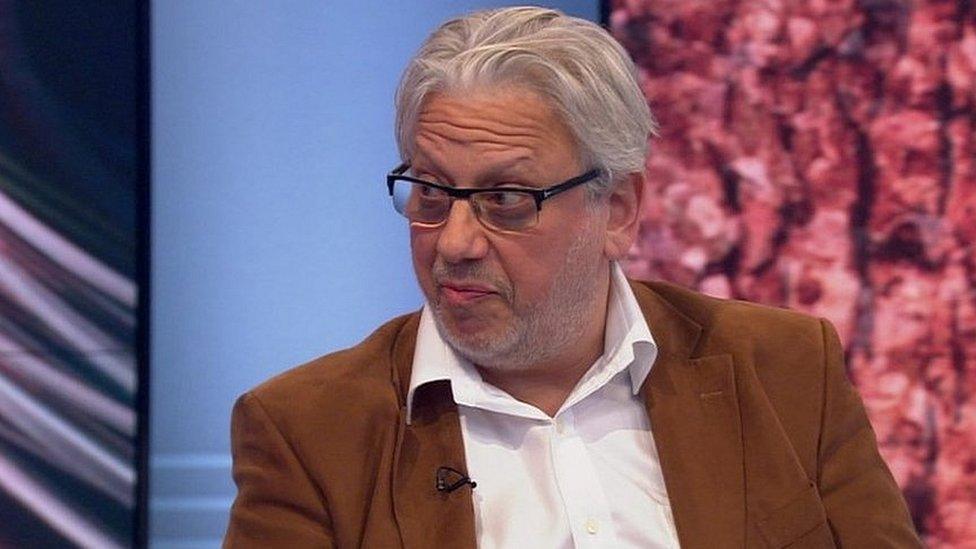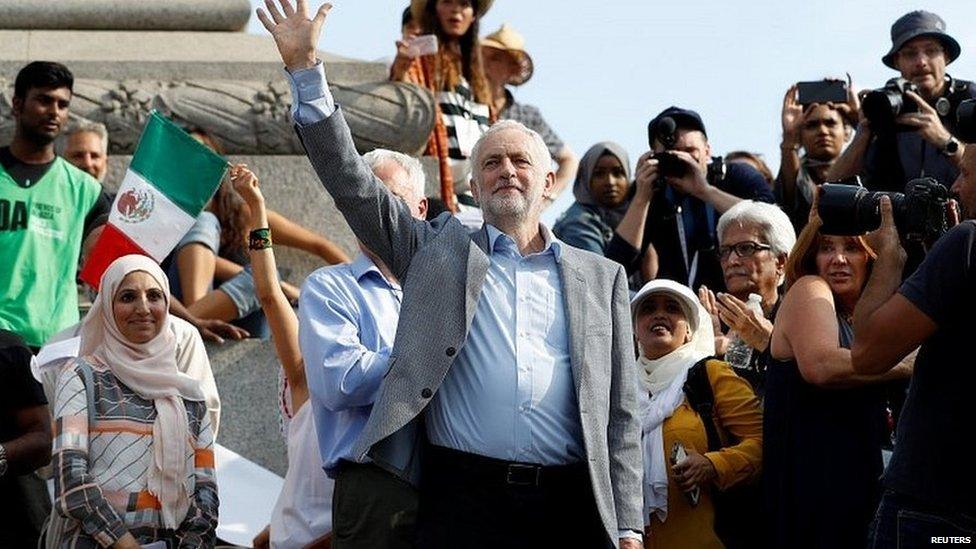Can Labour detoxify the anti-Semitism row?
- Published

Labour has been riven by accusations of growing anti-Semitism for more than two years
A bitter internal row about anti-Semitism has dominated media coverage of the Labour Party throughout the summer - and the leadership is keen to ensure it doesn't drown out the party's message at its annual conference next month.
Moves are under way to try to detoxify the issue. But can it be done in a way that satisfies everybody?
As Frank Field resigned the Labour whip on Thursday, the inner core of Labour's National Executive Committee (NEC) - the "officers' group"- was preparing to meet to draw up the agenda for what could be a stormy gathering of the full NEC next Tuesday.
That meeting is set to become the forum for deciding the party's position on tackling anti-Semitism.
In July, Labour adopted a new code of conduct for its MPs and other elected representatives.
The new code incorporated the International Holocaust Remembrance Alliance's working definition of anti-Semitism, external, which has been adopted by many public bodies in the UK and around the world since it was agreed in 2016.
But crucially, say critics of the Labour leadership's stance on this issue, it did not reproduce four of the 11 "contemporary examples" of anti-Semitism in public life, cited by the International Holocaust Remembrance Alliance (IHRA) as guiding its work.
Labour sources maintained that most of the excluded examples were covered by the new code, but had simply been reworded to give them disciplinary force.
For instance, the IHRA says that "Drawing comparisons of contemporary Israeli policy to that of the Nazis" is an example of anti-Semitism.
Labour's code says members should "resist" using Hitler or Nazi metaphors and that "such language carries a strong risk of being prejudicial or grossly detrimental to the party".
There was an outcry that not every example had been adopted, not just from some Jewish groups but from many Labour MPs too.
The Parliamentary Labour Party - its MPs - is due to be balloted on adopting the complete IHRA document, including all the examples, on 5 September, the day after the NEC meets.
While open to further amendments to the new code of conduct, there is one IHRA example of anti-Semitism in particular which Jeremy Corbyn and his supporters have been reluctant to adopt:
"Denying the Jewish people their right to self-determination, eg, by claiming that the existence of a State of Israel is a racist endeavour."
They say this would especially restrict the free speech of Palestinians - and the ability to discuss the circumstances around the foundation of the state of Israel.
But with Unite's Len McCluskey and Jon Lansman of Momentum (who are usually allies of the Labour leader) now willing to adopt the IHRA examples in full, the Left is not solidly behind the initial position taken by their party leader.
It also means there is now a majority on the NEC for full adoption of the IHRA document.
Opponents of Jeremy Corbyn will portray this as a setback, and question why he didn't adopt the IHRA's examples earlier.

Momentum founder Jon Lansman is among those in favour of adopting the IHRA definition in full
But his supporters are likely to argue that he hasn't been defeated, as at July's NEC meeting it was agreed to continue to consult on Labour's code and that the party has simply changed tack in light of the consultations.
Will this detoxify the issue? Well, that may depend on what accompanies the adoption of the IHRA examples.
Back in July, the pro-Palestinian MP Richard Burden suggested at a meeting of the Parliamentary Labour Party that it does indeed adopt the IHRA definition and examples in full - but that this, in his words, should be "IHRA plus" - the "plus" being a statement making clear that criticism of the Israeli government would still be legitimate.
He suggested that the party take a similar tack to the Commons Home Affairs Select Committee, which held an inquiry into anti-Semitism in 2016.
It recommended the adoption of the IHRA definition and examples by all political parties, but with the following addendum:
"It is not anti-Semitic to criticise the government of Israel, without additional evidence to suggest anti-Semitic intent. It is not anti-Semitic to hold the Israeli government to the same standards as other liberal democracies, or to take a particular interest in the Israeli government's policies or actions, without additional evidence to suggest anti-Semitic intent."
It is possible the NEC will take this approach.
But there are suggestions that more wide-ranging caveats could be added - effectively neutralising the effect of adopting the "racist endeavour" example of anti-Semitism.
It is possible the IHRA examples sit alongside Labour's code of conduct rather than be formally integrated.
And the NEC may make clear that the adoption of the IHRA examples would not lead to the retrospective disciplining of party members.

Some supporters of the Labour leader want party members to have the final say
Some Jewish groups which have been outspoken in their criticism of the Labour leadership would be far from satisfied with this outcome.
Euan Philipps, from Labour Against Anti-Semitism, has got his retaliation in first.
"For the Labour Party to claim that it has re-adopted the IHRA working definition of anti-Semitism then the party would need to ensure that the definition has a functional place within the organisation's disciplinary process," he said in a statement.
"If it is watered down by caveats and addendums then the party cannot claim that it has been fully adopted. It is a false compromise."
Conference pressure
So some caveats could severely weaken the IHRA antidote to this toxic political issue. But there is another possible, if unlikely, outcome next week.
Labour sources say there is a "three-month rule" at the NEC, which means the party's ruling body cannot return to exactly the same subject for further debate during this period.
I'm told at least some of those who oppose adopting all the IHRA examples are considering invoking this - trying to defer the whole issue until the Labour conference in late September.
That, of course, would mean that an anti-Semitism row would almost certainly overshadow that event.
It's hard to believe that the leadership would welcome this. Some NEC members tell me that as anti-Semitism will now formally be on the agenda it is inconceivable that it won't be discussed.
Nonetheless, there could be a procedural wrangle next week before anything of substance is debated.
A demonstration is being planned by the Camden Momentum group - which takes a quite different view from Momentum's founder and NEC member Jon Lansman - outside next week's meeting, highlighting differences on the Left over this issue.
It doesn't want the NEC to endorse the full IHRA document - and wants any decision to be taken by Labour's rank and file members.
Last week the Camden group passed the following motion:
"The members elected Jeremy Corbyn. The IHRA definition would return the party to the right which we voted down by a large majority - twice. Therefore, the members, not the NEC, nor the PLP, must decide whether or not to adopt the IHRA examples. WE DEMAND THAT THE DECISION BE PUT TO A VOTE OF ALL LABOUR PARTY MEMBERS'."
Also on the NEC agenda is a discussion of Labour's long-running Democracy Review.
Rule changes arising from this review - for example, a further reduction in MPs' influence in nominating future leadership contenders - will be put to next month's Labour conference.
Reselection battle
But what isn't in the Democracy Review document could be more controversial than what is. The review hasn't called for the mandatory reselection of MPs.
But some local constituency parties have been proposing rule changes to the way MPs and parliamentary candidates are selected - and it's likely these will be debated at Labour's conference.
They are calling for "open selections" - in other words sitting MPs could be challenged by other party members between each scheduled general election. And it's possible that they could get the backing of the influential left-wing Momentum group for this controversial change.
Momentum's current position is to reform the existing system of selecting candidates - where MPs aren't automatically challenged.
But if Momentum decides to back open selections following a meeting of its leadership on Saturday, it's more likely the Labour conference will do likewise.
I'm told there is strong grassroots pressure to do so.
The influential Unite union's official policy is also to support the mandatory reselection of MPs.
Labour former deputy leader Lord Hattersley has already warned that this could provoke a split.
And very senior and current figures in the party are privately warning that while there may not be a huge split, the party could splinter - with a handful of MPs initially sitting as independents in protest.
As politicians return to Westminster next week, Jeremy Corbyn will face the twin challenges of how to hold his party together and how to reach a consensus on tackling anti-Semitism.